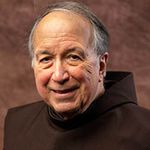Benedict the African

On April 3, the Franciscan family honors the memory of St. Benedict the Black or Benedict the African (1526-1589). He was referred to in Italian as “il Moro” (dark-skinned), and this was often translated into English as “the Moor.”
Benedict was born at San Fratello, a small town near Palermo, Sicily, to an African slave couple. Due to their good service, their son was declared free at birth. Benedict became a hard- working shepherd, devoted to prayer; he never went to school due to his poverty and remained illiterate all his life. When he was 21, a nobleman witnessed his patient attitude when insulted because of his race, and invited him to come with him and form an independent group of lay Franciscan hermits; there Benedict became the cook, and eventually became head of the group.
In 1564, Pope Pius V ordered groups of lay hermits to join an established religious order, and so Benedict entered the Friars Minor in Palermo, where he became the cook. He became highly regarded in the community for his dedication to the Franciscan Rule and spiritual insight, and was asked to become the master of novices, despite his illiteracy. He was eventually chosen guardian of the community. When his term was over, however, he happily returned to his work in the kitchen. He gained a reputation in Palermo as a spiritual guide and healer, and died there April 4, 1589. Benedict was beatified in 1743 and canonized in 1807. He is a patron of Palermo; devotion to him spread among Africans in the Caribbean and Brazil; he was also declared a patron of African-Americans in the United States, along with St. Peter Claver.
“I admonish and exhort my brothers in the Lord Jesus Christ that they beware of all pride, vainglory, envy, avarice, cares and worries of this world, detraction and complaint. And those who are illiterate should not be eager to learn. Instead, let them pursue what they must desire above all things: to have the Spirit of the Lord and his holy manner of working, to pray to him always with a pure heart and to have humility and patience in persecution and weakness. . . “
St Francis, Rule of the Friars Minor (1223), 10.7-9.

Cloister of friary in Palermo where Benedict spent his life as a friar
Dominic Monti, OFM
Professor of Franciscan Research in the Franciscan Institute of St. Bonaventure University
Dominic V. Monti, OFM, is a Franciscan Friar of Holy Name Province (USA) and currently professor of Franciscan Research in the Franciscan Institute of St. Bonaventure University. He devoted the greater part of his ministry to teaching the History of Christianity, in particular the history of the Franciscan movement. He has contributed two volumes to the Works of St. Bonaventure series and is author of Francis & His Brothers, a popular history of the Friars Minor.

